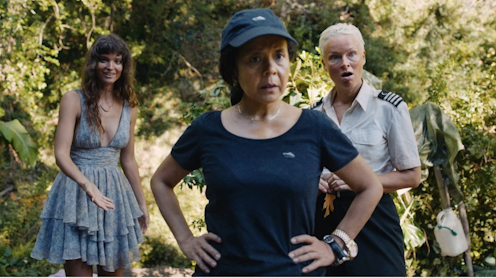The politics of the castaway story
- Written by Michael Lazarus, Dr Michael Lazarus teaches politics and philosophy at Monash University, Monash University

Ruben Östlund’s 2022 film Triangle of Sadness has attracted both praise and criticism as a satire of the world’s rich. Triangle of Sadness follows the familiar plot of a castaway story. A luxury cruise ship capsizes after a disastrous drinking session between the captain (an American communist) and a passenger (a Russian capitalist) in the midst of a storm, leaves the ship vulnerable to pirates, who blow it up. Several passengers escape and fight to survive on a desert island.
However, their social rank, class and privilege are washed away with the shipwreck. To survive, they cannot rely on their prevailing social power: money. Instead, each person must act in self-interest. This situation provokes depravity from the survivors and it is this aspect of the film that brings the success of its satire into question.
Satires employ allegories and moral fables to expose social dynamics and, often, make a political critique. But the easy corruption and ruthless, self-interested competition of each character in Triangle of Sadness seem to confirm rather than confront the dominant ideologies of global capitalism: get ahead or die.
The trope of shipwrecked survival is probably most paradigmatic in Robert Zemeckis’ prize-winning blockbuster Cast Away[1] (2000), starring Tom Hanks. Surprisingly self-serious, the film presents the audience with a ready-made morality tale.
By no fault of his own, a lone individual gets stranded on a desert island. Forced to survive from the ground up in adverse conditions, Chuck Noland (Hanks), demonstrates the power of the individual to persevere, proving his strength, ingenuity and determination. The only company Chuck has on the island is a volleyball he personifies, naming it after the sports brand adorning its surface – Wilson.
More recently, Ridley Scott’s The Martian (2015), had Matt Damon farming Mars, claiming “once you grow crops somewhere, you have officially colonised it”.
The castaway story has helped promulgate a view about human nature as eternal and unchanging. By taking human beings out of society, our supposedly fundamentally individualist survival instincts come to the fore.
However, the castaway story reflects on the relationship between individuals and society. A number of important questions arise from this relationship, including our place in nature, our autonomy as individuals, our ability to be collective and social, and the existence of different forms of power, inequality and domination.
The desert island story serves as an abstraction to think about what is “natural” in our interaction with others. On the island, would we fight or co-operate?
Read more https://theconversation.com/the-politics-of-the-castaway-story-200827
















